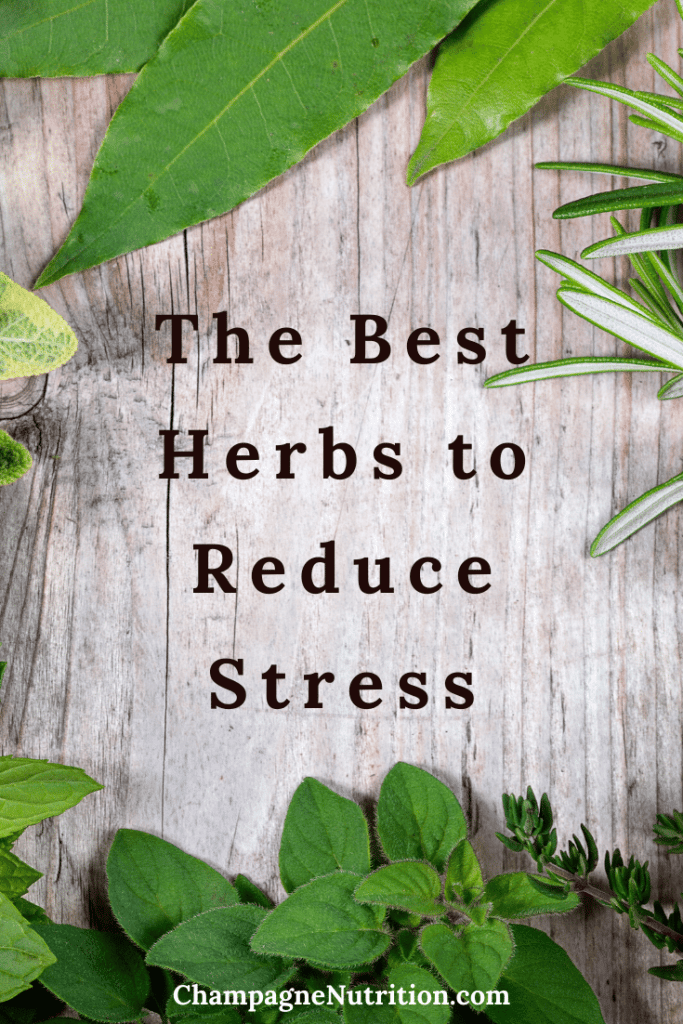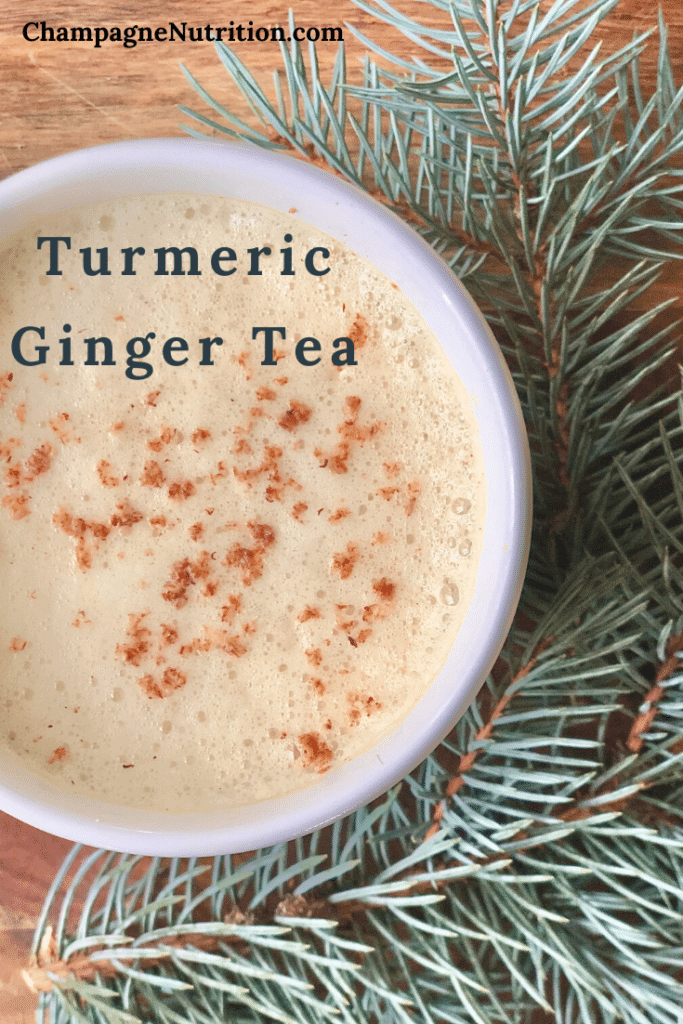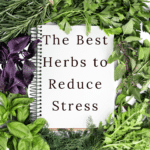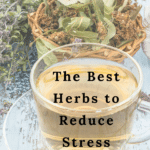The Best Herbs to Reduce Stress
February 13, 2017 by Ginger Hultin MS RDN
Do you ever find yourself overwhelmed and constantly ‘busy’ balancing one thing after another? Worried about the future or how much change is going on right now? Under stress, the body has to adapt by changing your hormones and even making adjustments in blood pressure. Stress can be emotional or mental – imagine a work deadline, relationship problems, illness, or balancing money or family priorities. It could also be physical – toxins in our environment, an unhealthy diet, chemical exposure from cleaning and body products, or air pollution. Some stress is good; for example, physical activity challenges the body and helps it adapt to become stronger and more in shape. But chronic, long-term stress can wreak havoc on the body’s systems, causing imbalance. One of the ways to help the body adapt to stress is a class of herbs called adaptogens, so today I’m talking about the Best Herbs to Reduce Stress to help support your body now.

The Best Herbs to Reduce Stress
There is a class of herbs, adaptogenic herbs, whose compounds aid in improving the stress response of the body, and providing calming and hormone balancing properties. These adaptoges may individually and collectively help enhance energy, improve sleep, and support the immune system as they help modulate the stress response of the body. Many herbs that help the body adapt are aiming to support the adrenal glands which can experience fatigue or even complete burn-out when under long-term, chronic stress. These compounds inhibit stimulation of the hypothalamus in the brain, stopping the cascade that causes the release of more stress hormones.
The Best Stress-Reducing Adaptogens:
- Asian ginseng: Native to the Far East, Asian ginseng has been used for thousands of years. Asian ginseng roots can be prepared in two ways and you will see them called red ginseng and white ginseng. Asian ginseng is used to reduce stress and inflammation, improve memory and mood, increase energy levels and support immune function. Freshly cut ginseng root can be added to hot water and steeped for a few minutes for a cup of tea. It can also be used in soups and stir-frys.
- Ashwagandha: Ashwagandha has been used in the Indian Ayurvedic medicine system for thousands of years. Some of its uses include reducing stress and anxiety, reducing cortisol levels (the hormone released when blood sugars are low or when under chronic long-term stress), and increasing energy. Ashwagandha is primarily available as a supplement.
- Scutellaria: A flowering plant in the mint family is also known as Skullcap. There are two types, American skullcap, native to North America and Chinese Skullcap, native to Asian countries and Russia. Scutellaria has been used in Chinese medicine for thousands of years. Some uses include boosting mood, reducing anxiety, and it has anti-inflammatory effects. Scutellaria is available as a tea or supplement.
- Holy basil: Also known as tulsi, is native to the Indian continent and has been used in Ayurvedic medicine for thousands of years. It has been used for reducing stress and anxiety, improving mood, and it has anti-inflammatory effects. It has a spicy and bitter taste. The leaves can be used in cooking or you can use them to make tea.
- Rhodiola: From the cold, mountainous regions of Europe and Asia, rhodiola has been found to “increase the body’s resistance to stress, exhaustion and fatigue”. It can be made into a tea, but is more commonly taken in supplement form.
Adaptogens are powerful herbs and should be dosed by an expert with a health target in mind. They are rarely given alone and rather are used in combination depending on a person’s needs. The nice thing is that you can actually include these in tea and I often recommend that for my clients when they need a work (or family) break during the day. I regularly contribute to a very cool health and wellness site called Foodtrients where I write about evidence-based nutrition topics so you can definitely find more info on their blogs as well but I thought you’d find this helpful here as well!

A word of Caution about Taking Herbs
Keep in mind there have been some cases when an adaptogenic herb was confused with another herb that is toxic, so be sure to work with a provider you trust in determining which herbs to take. Herbalists, pharmacists, naturopathic doctors and dietitians are all good people to discuss this with. Further, some of these herbs can cause calming or stimulating effects so caution should be taken before mixing with other herbs or medication. Effects can vary based on the soil and climate the plant was grown in, how it was stored, the parts of the plant used as well as processing and extraction. Standardization of herbs makes research on these topics more complicated but should not exclude them from consideration. As with any supplement, make sure you purchase from a trusted brand. If possible, look for a USP seal on the label. USP is a third-party, non-profit organization that verifies supplements are what the label claims and do not include anything not on the label. Some of the best herbs to reduce stress can be included in really safe ways and I’ve got some tips for you below.
Could your adrenal glands and stress response use some support? Aside from stress relief in the form of relaxation, deep breathing, mediation, or physical activity, be sure to discuss with your health care provider to find out if adaptogenic herbs could be another tool for your stress support this season. This is a big area of expertise for me so if you have questions, make sure to contact me here.
Herbs of all types are easy to include in your daily meals and beverages. Basil, rosemary, sage, and thyme are great seasonings for vegetables. Ginseng, holy basil, mint, ginger, and lavender can be made into tea and enjoyed anytime throughout the day. To get you started, here are a few simple recipes that I’ve got up on the blog. And remember, including herbs in food is almost always a completely safe practice!
Roasted Broccoli with Rosemary
Kalamata Olive and Basil Tapenade Dip
Farro Risotto with Butternut Squash and Sage

Ginger Hultin,MS, RD, CSO
Thanks for visiting! If you're struggling with a cancer diagnosis, autoimmune condition, gut health problems, or even a medical mystery, nutrition can make a HUGE difference in your day-to-day life. I run a virtual, concierge private practice where I partner with my clients over time to help them improve their health through nutrition. Be sure to visit the blog for easy, plant-based, anti-inflammatory recipes and our "Resources" page for a variety of self-paced programs, books, e-books, and nutrition podcast episodes.


